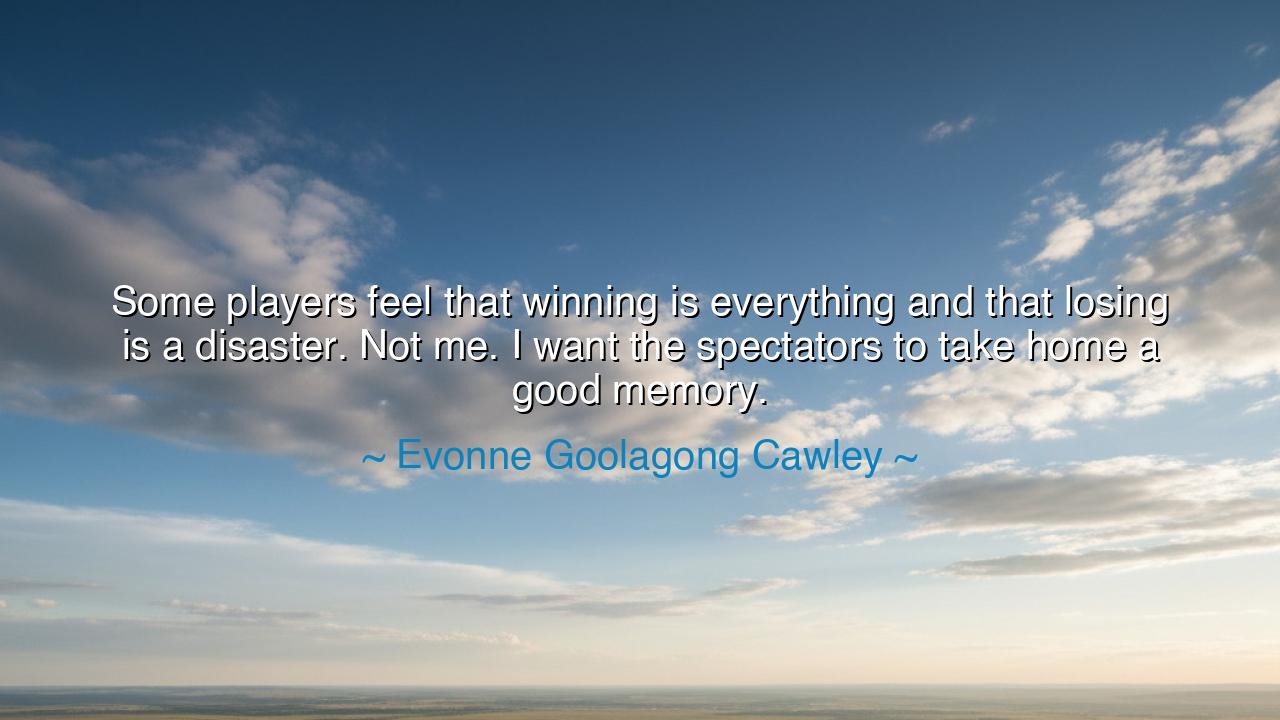
Some players feel that winning is everything and that losing is a
Some players feel that winning is everything and that losing is a disaster. Not me. I want the spectators to take home a good memory.






In the amphitheater of sport, where crowds hum like a living sea and rackets sing their brief thunder, a gentler creed is spoken: “Some players feel that winning is everything and that losing is a disaster. Not me. I want the spectators to take home a good memory.” Thus speaks Evonne Goolagong Cawley, and her words move like cool wind after a hard noon. She does not reject the fire of competition; she refuses its idolatry. The game, she teaches, is a vessel for something larger than the scoreboard—a ceremony in which grace, joy, and shared wonder may be offered to those who came to watch.
Mark how the saying rebukes our age’s accountants of glory. To make winning “everything” is to narrow the field until only one flower may grow. To call losing a “disaster” is to mistake weather for climate, a single match for a life. Evonne’s creed widens the court: there is craft to be honored, movement to be savored, a dialogue between opponents that can end in handshakes and light. And there is the great third partner—the spectators—whose hearts carry the game beyond the chalked lines, into kitchens and playgrounds and the long memory of a city.
Consider the life from which the creed arose. A Wiradjuri girl who struck balls against a wall of eucalyptus shadow grew to lift seven major titles, smiling as if she had smuggled sunlight into the stadium. In 1980, as a mother—first since 1914 to do so—she won Wimbledon again, not by grim hunger alone but by a rhythm that looked like play. Those who watched spoke of her footwork as dance, her temperament as weathered kindness. Even in defeat, the crowd felt enlarged. This is the heart of her sentence: to play in such a way that strangers leave better than they arrived.
There is a tale told by elders of the game. On a hot afternoon, a young fan wept when his favorite lost to Evonne. She went to the boy, placed the towel around his shoulders, and spoke softly of courage and tomorrow. The fan later said he remembered not the score but the gentleness; he kept the towel for years as a banner of what sport could be. Here is the good memory she wants sent home with the public: not merely “I saw a champion,” but “I saw a human being shining.”
History echoes her wisdom beyond tennis. When Jesse Owens ran in Berlin, he carried more than himself; when Roger Federer loses a five-setter and smiles through the ceremony, he teaches a country how to contain sorrow without bitterness. In each case the athlete knows: the event is larger than the victor. Spectators do not come only to count; they come to be changed. The athlete who remembers this becomes more than a competitor; she becomes a custodian of the common spirit.
What lesson do we hand to those who lace shoes and to those who sit in the stands? That results are transient, but conduct is generational. To worship winning as everything is to starve the soul that must live with its methods; to call losing a disaster is to forget that character is built under clouds as surely as under sun. Let the aim be excellence braided with delight, ferocity yoked to courtesy, spectacle married to meaning. Let the measure of a match include the aftertaste it leaves in the hearts who watched.
Take actions plain and sturdy. If you play: pursue mastery, but carry joy—let your body speak beauty even under pressure; greet opponents with full eye and firm hand; thank ball kids and umpires by name; remember that a child is learning how to live by watching how you win and how you lose. If you coach: praise choices as much as outcomes; make gratitude part of practice; teach that the crowd is company, not prey. If you watch: cheer for courage on both sides; savor great points regardless of colors; take home one good memory and share it generously, so the game grows larger than the day. In this way we honor Evonne’s true championship: not only the trophies lifted, but the lives lifted with them.






AAdministratorAdministrator
Welcome, honored guests. Please leave a comment, we will respond soon